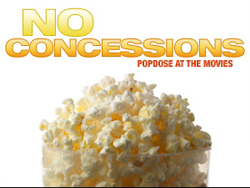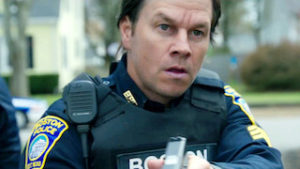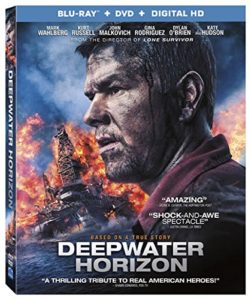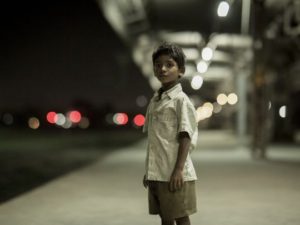 The inauguration making you nervous? Perfectly timed, The Founder will give you the shakes–with a burger and a side of fries. In another sensational performance, following his career-revivifying work in Birdman and Spotlight, Michael Keaton is Ray Kroc, the “founder” of McDonald’s–or, more to the point, the browbeaten restaurant supplies salesman who in the early 50s happened to find the original McDonald’s on his rounds. Operating frugally, but innovatively and efficiently, in San Bernardino, CA, since the 40s, the brothers McDonald (a genial John Carroll Lynch and a more suspicious, if not suspicious enough, Nick Offerman) had a good thing going. But Kroc saw more for the little burger joint that could–much more than the close-knit siblings ever did. You feel for them as Kroc wheedles and cajoles and quietly builds an empire from their idea. It’s dismaying what happens to their dream.
The inauguration making you nervous? Perfectly timed, The Founder will give you the shakes–with a burger and a side of fries. In another sensational performance, following his career-revivifying work in Birdman and Spotlight, Michael Keaton is Ray Kroc, the “founder” of McDonald’s–or, more to the point, the browbeaten restaurant supplies salesman who in the early 50s happened to find the original McDonald’s on his rounds. Operating frugally, but innovatively and efficiently, in San Bernardino, CA, since the 40s, the brothers McDonald (a genial John Carroll Lynch and a more suspicious, if not suspicious enough, Nick Offerman) had a good thing going. But Kroc saw more for the little burger joint that could–much more than the close-knit siblings ever did. You feel for them as Kroc wheedles and cajoles and quietly builds an empire from their idea. It’s dismaying what happens to their dream.
What’s insidious about The Founder is the Kroc, for all his underhandedness, isn’t a villain. Reared on self-help books, he sees a different dream, and pursues it. “Contracts are like hearts–they’re made to be broken,” he tells his bamboozled partners. The same logic applies to his first marriage, as his wife (Laura Dern) is frozen out for a more appealing prospect (Linda Cardellini)–who happens to be the spouse of a business partner (Patrick Wilson) higher on the food chain than the humble McDonalds brothers. When the climbs every rung on the ladder of the food service industry, he erects a new one, into the far bigger money of real estate. “Franchise, franchise, franchise” is his mantra–and Keaton effortlessly sells the idea of bigger as better. The movie complicates our loyalties, to the little guys left behind and the big one who distorts their pure intentions and remakes a not insignificant pocket of the world. A squabble over powdered vanilla milkshakes plays out as farce, something silly–yet it’s also, as our new president might say, “yuge.” (There’s a hint of Tom Jones in how that same formula, the future Joan Kroc’s discovery, cements her relationship to her second husband.) Akin to someone like Paul Newman’s Hud, you never stop liking Kroc, an unethical bastard, and a razor-sharp striver who’s alert to every possibility as everyone else just sort of settles.
The Founder, written in ice water by the acerbic Robert D. Siegel (of the unsettling Patton Oswalt film Big Fan), was directed by John Lee Hancock, of more optimistic entertainments like The Blind Side. Their temperaments harmonize. (Mention must also be made of perennial motion picture MVP Carter Burwell, whose score unifies the light and dark tones of the story.) With surprising deftness, Hancock stages an early montage recreating how the McDonalds perfected their efficient operation, American ingenuity at its finest and most wholesome. At which point the underdog observing the fruition of their hopes soon becomes an overlord. All is founded, and something is lost.
 In his 45 years Mark Wahlberg has been many things, but what he really wanted to be, or so he once said (briefly) was a terrorist fighter. And now, he is. Reuniting with director Peter Berg, Patriots Day landed in the same boxoffice sweet spot as their first collaboration, Lone Survivor, which established a beachhead in January for contemporary war movies. Briefly. The next year’s American Sniper hit it big, then the trail went cold with Michael Bay’s forgettable Benghazi retelling 13 Hours and, now, this third “Wahl-Berg” movie. Which surprised me–I saw it two months ago at an early screening and it worked in the room. Which was as it should–it’s a well-crafted requiem for the Boston Marathon terror bombing, soberly respectful of the horror of the incident, that becomes a suspenseful police procedural, ending with frenzied pursuits and a crazy siege as justice catches up with the sibling perpetrators.
In his 45 years Mark Wahlberg has been many things, but what he really wanted to be, or so he once said (briefly) was a terrorist fighter. And now, he is. Reuniting with director Peter Berg, Patriots Day landed in the same boxoffice sweet spot as their first collaboration, Lone Survivor, which established a beachhead in January for contemporary war movies. Briefly. The next year’s American Sniper hit it big, then the trail went cold with Michael Bay’s forgettable Benghazi retelling 13 Hours and, now, this third “Wahl-Berg” movie. Which surprised me–I saw it two months ago at an early screening and it worked in the room. Which was as it should–it’s a well-crafted requiem for the Boston Marathon terror bombing, soberly respectful of the horror of the incident, that becomes a suspenseful police procedural, ending with frenzied pursuits and a crazy siege as justice catches up with the sibling perpetrators.
But audiences haven’t bitten. Is it too soon for a docudrama? Have documentaries focused more on the victims slaked our interest in the subject? Was it wrong to position it as some sort of awards contender? Did a more upbeat slice of history, Hidden Figures, eat its lunch? I don’t know. It’s not perfect–Wahlberg is playing one of those “composite” characters, a shoot-from-the-lip officer, who has to be in every scene, no matter how tenuous his presence is to the action. He’s a grating device. Far more suspect is how the movie presents the wife of one of the terrorists (a change of pace for Melissa Benoist, TV’s perky Supergirl)–the end titles say she hasn’t been charged with complicity, but the movie puts her in every scene with the brothers, always within earshot of their conversations. The guilt by association is questionable, to say the least. Boston’s favorite son wants to give us some more payback, and does so with a heavy hand. (A Chinese student, kidnapped by the bombers, tells the police to “get those motherfuckers” once freed, the Wahl-Berg idea of a mosaic of citizenry.)
 Ending with documentary footage that puts a real-life “button” on the simulation, Patriots Day has some semblance of a happy ending. The second of their three films together, Deepwater Horizon, is an epic fail about an epic fail. The downer aspect of the massive oil spill is elided (we see one miserably hampered sea bird) in favor of the actual accident, which killed eleven. Here Wahlberg plays an actual person, again separated from his supportive, interchangeable wife, in the midst of vividly rendered chaos. (Now on home video, it’s total disaster porn on Blu-ray, with a Dolby Atmos soundtrack that’s like depth charges going off in your living room, boom boom boom for a full half hour.) Once again, the physical aspect is faultless, and the cast is mostly strong, with a stalwart Kurt Russell, a safety-conscious crewman, the unsurprising standout. (More’s the pity that much of the exposition is drawlingly delivered by the corner-cutter played by John Malkovich, whose accent could use Dolby decoding.) Supplements, including a VR peek into the editing bay, do a fine job explaining how a complicated, and expensive, production came to be. But no seems to have realized that the name “Deepwater Horizon” is synonymous with debacle, giving off bad vibes that no rig heroics (and it was a nail-biter onboard) could blunt. After two well-intentioned disappointments in the real world, Wahlberg returns to the safe space of a Transformers sequel this summer.
Ending with documentary footage that puts a real-life “button” on the simulation, Patriots Day has some semblance of a happy ending. The second of their three films together, Deepwater Horizon, is an epic fail about an epic fail. The downer aspect of the massive oil spill is elided (we see one miserably hampered sea bird) in favor of the actual accident, which killed eleven. Here Wahlberg plays an actual person, again separated from his supportive, interchangeable wife, in the midst of vividly rendered chaos. (Now on home video, it’s total disaster porn on Blu-ray, with a Dolby Atmos soundtrack that’s like depth charges going off in your living room, boom boom boom for a full half hour.) Once again, the physical aspect is faultless, and the cast is mostly strong, with a stalwart Kurt Russell, a safety-conscious crewman, the unsurprising standout. (More’s the pity that much of the exposition is drawlingly delivered by the corner-cutter played by John Malkovich, whose accent could use Dolby decoding.) Supplements, including a VR peek into the editing bay, do a fine job explaining how a complicated, and expensive, production came to be. But no seems to have realized that the name “Deepwater Horizon” is synonymous with debacle, giving off bad vibes that no rig heroics (and it was a nail-biter onboard) could blunt. After two well-intentioned disappointments in the real world, Wahlberg returns to the safe space of a Transformers sequel this summer.
 I figured Lion, a slice of Oscar bait from the never-say-die Weinstein Company, would let me down. Had it not been racking up awards nominations here and there, which nudged me to go, I wouldn’t have bothered. But it flattened me, pushing all my parent buttons, and I made sure mine had their address and telephone number memorized once I saw them following a screening. I’m sniffling all over again, writing about how little Saroo, accidentally separated from his family in an impoverished, illiterate patch of India, endures Dickensian hardships before being adopted by an Australian couple (David Wenham and Nicole Kidman, who is showcased in one lovely scene and doesn’t seem to be jinxing the film too much at the boxoffice, as she usually does). Flash-forward 20 years, and the grown Saroo (Dev Patel) begins a quixotic search for his kin via Google Earth. I thought I knew this story from the accounts of it five years ago, yet the movie has a narrative surprise or two in store, and while the second half of Lion doesn’t have the same impact of the first, the conclusion floored me again. Mostly what Lion lacks as it goes on is eight-year-old Sunny Pawar as Saroo, a wonderful child performance from a boy ideally named. I wanted to fling out my arms and protect him at every moment, not that he needed my help; he negotiates every twist with great spirit and resilience, and damned if my keyboard isn’t wet with tears reliving this. (Don’t like kids? It’s a great railway movie, too, if that gets you in the door.) We can all use a little of that Saroo spirit in the coming days, and embracing Lion may help see you through.
I figured Lion, a slice of Oscar bait from the never-say-die Weinstein Company, would let me down. Had it not been racking up awards nominations here and there, which nudged me to go, I wouldn’t have bothered. But it flattened me, pushing all my parent buttons, and I made sure mine had their address and telephone number memorized once I saw them following a screening. I’m sniffling all over again, writing about how little Saroo, accidentally separated from his family in an impoverished, illiterate patch of India, endures Dickensian hardships before being adopted by an Australian couple (David Wenham and Nicole Kidman, who is showcased in one lovely scene and doesn’t seem to be jinxing the film too much at the boxoffice, as she usually does). Flash-forward 20 years, and the grown Saroo (Dev Patel) begins a quixotic search for his kin via Google Earth. I thought I knew this story from the accounts of it five years ago, yet the movie has a narrative surprise or two in store, and while the second half of Lion doesn’t have the same impact of the first, the conclusion floored me again. Mostly what Lion lacks as it goes on is eight-year-old Sunny Pawar as Saroo, a wonderful child performance from a boy ideally named. I wanted to fling out my arms and protect him at every moment, not that he needed my help; he negotiates every twist with great spirit and resilience, and damned if my keyboard isn’t wet with tears reliving this. (Don’t like kids? It’s a great railway movie, too, if that gets you in the door.) We can all use a little of that Saroo spirit in the coming days, and embracing Lion may help see you through.
Need a lift? Sing it, Shirley.





Comments